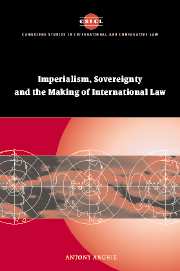Book contents
- Frontmatter
- Contents
- Foreword
- Acknowledgements
- Table of cases
- Table of treaties
- Introduction
- 1 Francisco de Vitoria and the colonial origins of international law
- 2 Finding the peripheries: colonialism in nineteenth-century international law
- 3 Colonialism and the birth of international institutions: the Mandate System of the League of Nations
- 4 Sovereignty and the post-colonial state
- 5 Governance and globalization, civilization and commerce
- 6 On making war on the terrorist: imperialism as self-defence
- Conclusion
- Bibliography
- Index
- CAMBRIDGE STUDIES IN INTERNATIONAL AND COMPARATIVE LAW
2 - Finding the peripheries: colonialism in nineteenth-century international law
Published online by Cambridge University Press: 05 August 2012
- Frontmatter
- Contents
- Foreword
- Acknowledgements
- Table of cases
- Table of treaties
- Introduction
- 1 Francisco de Vitoria and the colonial origins of international law
- 2 Finding the peripheries: colonialism in nineteenth-century international law
- 3 Colonialism and the birth of international institutions: the Mandate System of the League of Nations
- 4 Sovereignty and the post-colonial state
- 5 Governance and globalization, civilization and commerce
- 6 On making war on the terrorist: imperialism as self-defence
- Conclusion
- Bibliography
- Index
- CAMBRIDGE STUDIES IN INTERNATIONAL AND COMPARATIVE LAW
Summary
By the simple exercise of our will we can exert a power for good practically unbounded.
Introduction
International law is universal. It is a body of law which applies to all states regardless of their specific and distinctive cultures, belief systems and political organizations. It is a common set of doctrines which all states, whether from Europe or Latin America, Africa or Asia use to regulate relations with each other. The association between international law and universality is so ingrained that pointing to this connection appears tautologous; it is today hard to conceive of an international law which is not universal. And yet, the universality of international law is a relatively recent development. It was not until the end of the nineteenth century that a set of doctrines was established as applicable to all states, whether these were in Asia, Africa or Europe.
The universalization of international law was principally a consequence of the imperial expansion which took place towards the end of the ‘long nineteenth century’. The conquest of non-European peoples for economic and political advantage was the most prominent feature of this period termed, by one eminent historian, the ‘Age of Empire’. By 1914, after numerous colonial wars, virtually all the territories of Asia, Africa and the Pacific were controlled by the major European states and this resulted in the assimilation of all these non-European peoples into a system of law which was fundamentally European in that it derived from European thought and experience.
- Type
- Chapter
- Information
- Imperialism, Sovereignty and the Making of International Law , pp. 32 - 114Publisher: Cambridge University PressPrint publication year: 2005
- 7
- Cited by

